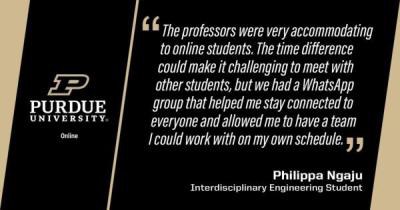Engineering Graduate's Cost-Effective, Reliable Infusion System Earns International Plaudits, Awards
 WEST LAFAYETTE, Ind. — Infusion pumps are a key medical device designed to deliver intravenous medications and nutrients to patients in controlled amounts that treat their conditions without underdosing or overdosing them, a particular danger for children whose smaller bodies are less tolerant.
WEST LAFAYETTE, Ind. — Infusion pumps are a key medical device designed to deliver intravenous medications and nutrients to patients in controlled amounts that treat their conditions without underdosing or overdosing them, a particular danger for children whose smaller bodies are less tolerant.
Purdue University graduate student Philippa Ngaju Makobore saw that problem in her home country of Uganda, where one in ten children seek medical attention too late and require intravenous therapy. Infusion procedures, even when pumps are available, often get carried out manually by clinical staff with various levels of skill and training, which introduces human error into the equation and can compromise patient safety.
Makobore, who graduated in May 2020 with a master’s of science in interdisciplinary engineering with a concentration in biomedical engineering, applied her time with Purdue to taking steps on the path to making a leap in addressing this problem. Purdue’s interdisciplinary engineering master’s is open to students even if, like Makobore, they can’t come to campus thanks to an online version of the program. Makobore completely her degree entirely online.
The innovative Electronically Controlled Gravity Feed Infusion Set that the young inventor used her online Purdue experience to advance has won two major international prizes, an Innovation Prize for Africa and a German-African Innovation Incentive Award, the latter received after clinical trials with children and adults were funded by Grand Challenges Canada. She’s also won a Patient Safety Movement Foundation innovation award. Money from the prizes has gone to further development of her invention.
The low-cost device, which could be a leap forward not only in Africa but worldwide, is designed to deliver intravenous fluids and drugs by controlling the flow rate based on feedback from a sensor. It is easy to operate and includes safety features such as alarms that sound if the fluid flow is too fast or slow, the fluid volume is too high or low, or a sensor is faulty. It runs on a battery that can be charged from a plug or solar power.
 Makobore works in Kampala, Uganda, as a researcher at the Uganda Industrial Research Institute, designing noninvasive medical devices for application in low-resource settings. The institute is where she and colleagues initially identified the lack of appropriate and affordable infusion devices as a standout need.
Makobore works in Kampala, Uganda, as a researcher at the Uganda Industrial Research Institute, designing noninvasive medical devices for application in low-resource settings. The institute is where she and colleagues initially identified the lack of appropriate and affordable infusion devices as a standout need.
She said she chose Purdue to expand her skills in medical device design because it offered the opportunity to combine Purdue’s top-ranked engineering programs and exceptional engineering faculty with work on developing her infusion device.
Purdue also has a reputation for innovation; it is ranked the fifth most innovative school nationally by U.S. News and World Report.
“The ability to directly apply skills learned to actual research work in medical device design was very valuable, including the consultation with professors to further improve on particular aspects of my research,” Makobore said.
She took Young Kim’s biostatistics class and Kim, associate professor of biomedical engineering, worked with her on statistical aspects of a pediatric clinical trial for the infusion device.
“She clearly demonstrated that she is able to quickly grasp the statistical concepts and to utilize the various frameworks taught in class,” Kim said. “In addition, Philippa took the initiative to directly apply the concepts learned in class to her research on infusion controllers. Throughout this interaction, she exhibited her ability to be a successful independent researcher.”
Writer: Greg Kline, 765-494-8167, gkline@purdue.edu
Sources: Philippa Ngaju Makobore, pngaju@purdue.edu
Young Kim, youngkim@purdue.edu
Photo: Philippa Ngaju Makobore accepting a first-place innovation award from the Patient Safety Movement Foundation.
